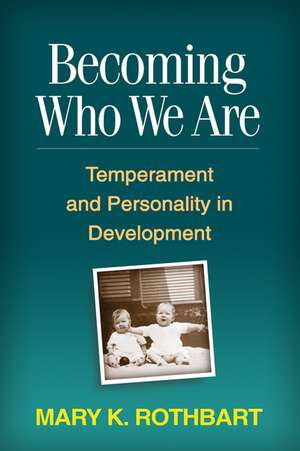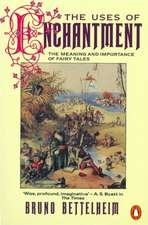Becoming Who We Are: Temperament and Personality in Development
Autor Mary K. Rothbarten Limba Engleză Paperback – 9 noi 2012
What are the basic dimensions of temperament? How does temperament influence children's relationships to their physical and social worlds--and their behavior and adjustment across the lifespan? What are its biological underpinnings? From preeminent researcher Mary Rothbart, this work comprehensively examines the role of temperament in the development of personality and psychopathology. In a direct and readable style, Rothbart combines theory and research with everyday observations and clinical examples. She offers new insights on "difficult" children and reviews intervention programs that address temperamental factors in childhood problems.
Winner--Eleanor Maccoby Book Award, American Psychological Association Division 7 (Developmental Psychology)
Winner--Eleanor Maccoby Book Award, American Psychological Association Division 7 (Developmental Psychology)
| Toate formatele și edițiile | Preț | Express |
|---|---|---|
| Paperback (1) | 260.05 lei 3-5 săpt. | +21.57 lei 6-10 zile |
| Guilford Publications – 9 noi 2012 | 260.05 lei 3-5 săpt. | +21.57 lei 6-10 zile |
| Hardback (1) | 495.60 lei 6-8 săpt. | |
| Guilford Publications – 12 apr 2011 | 495.60 lei 6-8 săpt. |
Preț: 260.05 lei
Preț vechi: 273.75 lei
-5% Nou
Puncte Express: 390
Preț estimativ în valută:
49.78€ • 51.20$ • 41.30£
49.78€ • 51.20$ • 41.30£
Carte disponibilă
Livrare economică 29 ianuarie-12 februarie
Livrare express 14-18 ianuarie pentru 31.56 lei
Preluare comenzi: 021 569.72.76
Specificații
ISBN-13: 9781462508310
ISBN-10: 1462508316
Pagini: 324
Ilustrații: black & white line drawings, black & white tables, figures
Dimensiuni: 152 x 229 x 20 mm
Greutate: 0.45 kg
Ediția:1
Editura: Guilford Publications
Colecția Guilford Press
ISBN-10: 1462508316
Pagini: 324
Ilustrații: black & white line drawings, black & white tables, figures
Dimensiuni: 152 x 229 x 20 mm
Greutate: 0.45 kg
Ediția:1
Editura: Guilford Publications
Colecția Guilford Press
Public țintă
Professional Practice & DevelopmentNotă biografică
Mary K. Rothbart, PhD, is Distinguished Professor Emerita of Psychology at the University of Oregon. Her research has focused on temperament, attention, emotion, and social development, and she has developed several widely used measures of temperament, including parent and self-report questionnaires, home observations, and laboratory observations. Dr. Rothbart's work with Michael Posner has explored the cognitive skills, attention networks, and attention genes that support effortful control in children. She has coauthored or coedited numerous books and has received numerous awards. Most recently, she received the Eleanor Maccoby Book Award from Division 7 (Developmental Psychology) of the American Psychological Association, for Becoming Who We Are. Dr. Rothbart has also received the Gold Medal Award for Life Achievement in the Science of Psychology from the American Psychological Foundation, the G. Stanley Hall Award for Distinguished Contribution to Developmental Psychology from the American Psychological Association, and the Award for Distinguished Scientific Contributions to Child Development from the Society for Research in Child Development. One of the offshoots of her early temperament research was the founding of Birth to Three, a parent support and education program that has reached thousands of families in the United States and abroad, and which recently celebrated its 30th birthday. Dr. Rothbart is most pleased to have received Birth to Three's Champion of Children award.
Cuprins
1. Definition and Historical Roots
2. The Structure of Temperament
3. The Biology of Temperament
4. Infancy
5. The Self and Structures of Meaning
6. Coping and Culture
7. Conscience and Competence
8. Stability and Change from Child to Adult
9. Problems and Interventions in Development
10. Temperament, Environment, and Psychopathology
11. Some Final Observations
2. The Structure of Temperament
3. The Biology of Temperament
4. Infancy
5. The Self and Structures of Meaning
6. Coping and Culture
7. Conscience and Competence
8. Stability and Change from Child to Adult
9. Problems and Interventions in Development
10. Temperament, Environment, and Psychopathology
11. Some Final Observations
Recenzii
"One of the wisest, most interesting, and most important books in psychology in recent years. A world-renowned expert, Rothbart brilliantly shows how temperament combines with experience to make us who we are."--Carol S. Dweck, PhD, Lewis and Virginia Eaton Professor of Psychology, Stanford University
"This outstanding book from the foremost world expert on temperament offers a creative and authoritative synthesis. A broad range of interrelated topics are addressed, including the development and structure of temperament and personality; connections to competence, conscience, and psychopathology; meaning structures; biological and environmental contributions to temperament; and interventions. Rothbart clarifies the multiple levels of factors that contribute to the course of human development. There is something for all developmental scientists and students in this accessible and well-written book."--Nancy Eisenberg, PhD, Regents' Professor of Psychology, Arizona State University
"In this excellent book, Rothbart brings her pioneering theory of temperament into full fruition. Her comprehensive presentation ranges from the history of temperament to its development into adult personality. Rothbart sets forth a clearly documented, dynamic perspective on the relation between temperament and personality. Through thought experiments, she reveals how individual differences develop within the child's social and physical environment. Discussions of psychopathology and interventions are included. This is a book for all researchers and clinicians interested in understanding how we become who we are."--Arnold J. Sameroff, PhD, Department of Psychology, University of Michigan
"Half the battle in child clinical work is deriving an effective formulation of a child's issues. Child clinicians who read this book will come up with more effective formulations. They will think in richer ways about concepts of temperament, how temperament influences and is influenced by the social environment, and implications for the child's social development and sense of self. The book also offers helpful discussions of temperament-informed interventions, such as parent training and executive function training."--John E. Bates, PhD, Department of Psychological and Brain Sciences, Indiana University
"While one of the longest-studied topics in psychology, temperament remains one of its toughest nuts to crack. Rothbart leads the reader along a compelling personal and scientific journey during which the many factors that combine to make us unique individuals--biological, social, and developmental--are carefully assessed and elucidated. Rothbart's writing style is clear and engaging. This book not only reflects the current state of the field, but also, I suspect, will shape its future."--Mark H. Johnson, PhD, Professor and Director, Centre for Brain and Cognitive Development, Birkbeck College, University of London, United Kingdom
"This book provides a comprehensive and substantive basis for understanding temperament, personality, development, and the links among them. Importantly, and a rare accomplishment, it also provides useful insights into how temperamental differences affect individuals' everyday lives, their achievements, and their problems. The book is grounded in solid theory and evidence but reflects Rothbart’s sensitivity to children, parents, and families. She is an eminent developmental researcher who brings real clinical insights to an important topic. A 'must read.'"--Barbara Keogh, PhD, Professor Emerita, Graduate School of Education and Department of Psychiatry, University of California, Los Angeles; author of Temperament in the Classroom-A thoughtful, scientific, and wise analysis of what we have learned about temperament, development, and personalityand where we have to press further. The three themes of this remarkable book/m-/temperament, development, and personalityare skillfully interwoven to create an account of the development of socioemotional individuality throughout life....[A] well-written and engaging volume.--Journal of Applied Developmental Psychology, 9/1/2012"This outstanding book from the foremost world expert on temperament offers a creative and authoritative synthesis. A broad range of interrelated topics are addressed, including the development and structure of temperament and personality; connections to competence, conscience, and psychopathology; meaning structures; biological and environmental contributions to temperament; and interventions. Rothbart clarifies the multiple levels of factors that contribute to the course of human development. There is something for all developmental scientists and students in this accessible and well-written book."--Nancy Eisenberg, PhD, Regents' Professor of Psychology, Arizona State University
"In this excellent book, Rothbart brings her pioneering theory of temperament into full fruition. Her comprehensive presentation ranges from the history of temperament to its development into adult personality. Rothbart sets forth a clearly documented, dynamic perspective on the relation between temperament and personality. Through thought experiments, she reveals how individual differences develop within the child's social and physical environment. Discussions of psychopathology and interventions are included. This is a book for all researchers and clinicians interested in understanding how we become who we are."--Arnold J. Sameroff, PhD, Department of Psychology, University of Michigan
"Half the battle in child clinical work is deriving an effective formulation of a child's issues. Child clinicians who read this book will come up with more effective formulations. They will think in richer ways about concepts of temperament, how temperament influences and is influenced by the social environment, and implications for the child's social development and sense of self. The book also offers helpful discussions of temperament-informed interventions, such as parent training and executive function training."--John E. Bates, PhD, Department of Psychological and Brain Sciences, Indiana University
"While one of the longest-studied topics in psychology, temperament remains one of its toughest nuts to crack. Rothbart leads the reader along a compelling personal and scientific journey during which the many factors that combine to make us unique individuals--biological, social, and developmental--are carefully assessed and elucidated. Rothbart's writing style is clear and engaging. This book not only reflects the current state of the field, but also, I suspect, will shape its future."--Mark H. Johnson, PhD, Professor and Director, Centre for Brain and Cognitive Development, Birkbeck College, University of London, United Kingdom
Descriere
What are the basic dimensions of temperament? How does temperament influence children's relationships to their physical and social worlds--and their behavior and adjustment across the lifespan? What are its biological underpinnings? From preeminent researcher Mary Rothbart, this work comprehensively examines the role of temperament in the development of personality and psychopathology. In a direct and readable style, Rothbart combines theory and research with everyday observations and clinical examples. She offers new insights on "difficult" children and reviews intervention programs that address temperamental factors in childhood problems.
Winner--Eleanor Maccoby Book Award, American Psychological Association Division 7 (Developmental Psychology)
Winner--Eleanor Maccoby Book Award, American Psychological Association Division 7 (Developmental Psychology)






